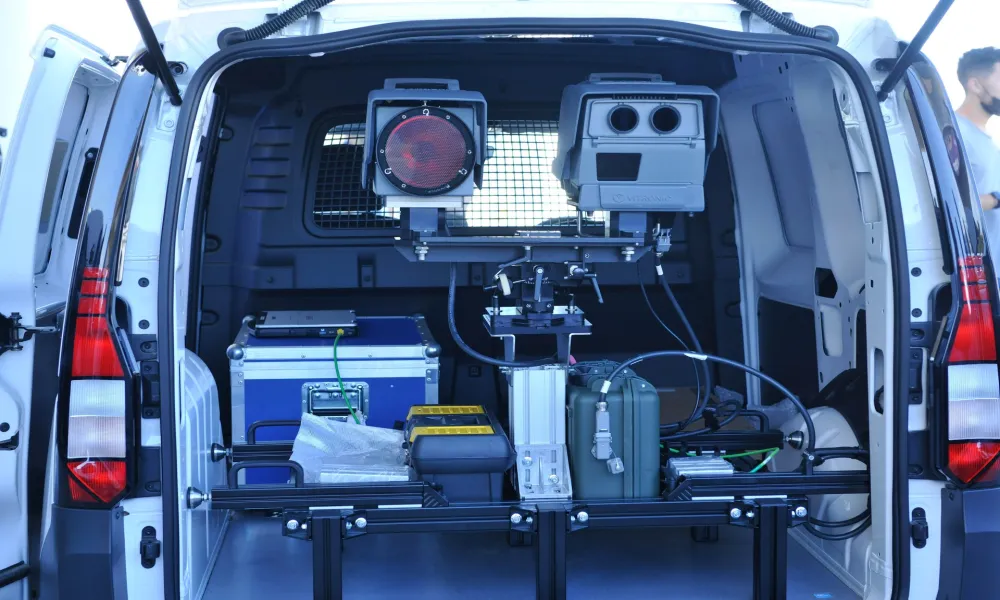A citizen has lodged a complaint with the Anti-Corruption Authority against the company Brink’s, which manages Cyprus’s traffic camera system, alleging the use of deceptive practices aimed at “trapping” drivers and issuing excessive on-the-spot fines for speeding violations.
The company operates 90 fixed and 20 mobile cameras nationwide. The complaint filed anonymously for obvious reasons was dismissed by the Authority on grounds that it was directed against a private company rather than a public body.
According to the complainant, in one area of the Limassol district, an employee of Brink’s allegedly placed a mobile camera warning sign behind a parked car, making it invisible to approaching drivers.
To support the claim, the citizen submitted a video to the Anti-Corruption Authority showing that the warning sign could not be seen from the road. The complainant accused the company of using unethical methods to ensnare drivers in order to maximise the number of fines issued.
Complaint dismissed
In its decision, the Anti-Corruption Authority stated: “The allegations in this complaint are directed against a private company and do not fall under the category of acts of corruption, nor do they contain evidence of criminal corruption offences. Therefore, the Authority has no jurisdiction to investigate.”
Under Articles 6(2) and 7(1) of the Law on the Establishment and Operation of the Independent Authority Against Corruption, the Authority may only examine complaints involving acts of corruption as defined in Article 2 of the same Law.
In the case of private-sector entities, jurisdiction applies only when public officials are directly involved. Since the complaint targeted a private company alone, the Authority was legally bound to reject it whether or not it had substance.
Mounting criticism
Public frustration is mounting over what many describe as entrapment tactics by mobile camera operators. Drivers complain that instead of enhancing road safety, the system functions as a revenue-generating mechanism.
By regulation, a warning sign must be placed between 100 and 5,000 metres ahead of a mobile camera to alert drivers. However, operators often fail to install these signs or place them where they are barely visible, such as behind parked vehicles, trees or within fields.
The issue has drawn sharp criticism in Parliament, with MPs Dimitris Dimitriou (DISY) and Chrysanthos Savvides (DIKO) denouncing the lack of proper signage during a recent House Transport Committee session.
Even MPs from governing parties have accused the system of being “a cash cow” and a “trap against citizens.”
The Police, meanwhile, appear to tolerate such practices, having publicly opposed proposals by DISY MP Nikos Georgiou to require prior publication of the general areas where mobile cameras will operate.
Cameras, cash and criminality
The controversy has also fuelled violent reactions which authorities strongly condemn. Since the system’s reintroduction less than three years ago, there have been 10 serious attacks against mobile camera operators, including two cases of attempted murder.
In October 2022, within just ten days, two separate incidents occurred:
-
On the Kokkinotrimithia–Nicosia motorway, two gunshots shattered the window of a camera van, injuring operators.
-
On the Larnaca–Ayia Napa motorway, two individuals on a dark-coloured motorcycle fired shots at another mobile camera vehicle.
Such attacks, while criminal and unjustifiable, highlight the public anger and distrust provoked by what many perceive as an exploitative system.
According to data submitted to Parliament by the Ministry of Justice in response to a question by MP Nikos Georgiou, the traffic camera system has generated €27,901,692 in revenue between 1 January 2022 and 1 September 2025.
